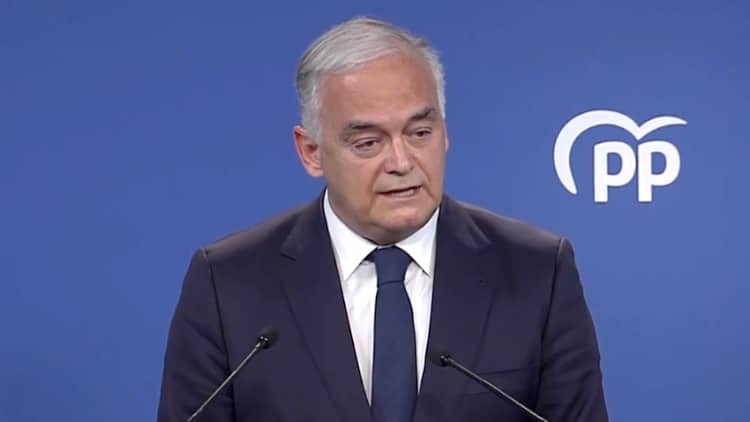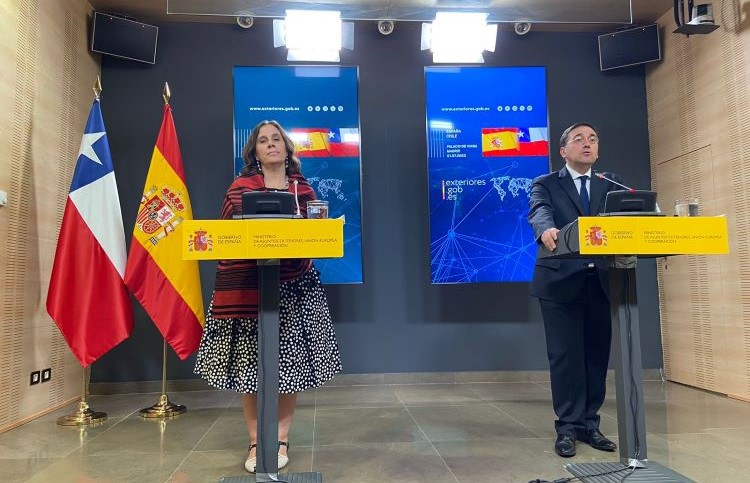The Diplomat
The PP warned the Government yesterday that before supporting the increase in defence spending and the military presence of the United States, it wants Pedro Sánchez to give them explanations and calls for a united stance from the PSOE and Podemos coalition Executive.
Yesterday, the PP’s Deputy Secretary for Institutional Affairs, Esteban González Pons, called on the President of the Government to call the main opposition party and explain the “small print” of the agreement reached with the US President, Joe Biden, and where he intends to get the money to increase the defence budget.
“They will have to call us if they want something,” said González Pons in statements to Telecinco, specifying that the call he received from the Minister of Defence, Margarita Robles, last Wednesday was to tell him what was “already in the newspapers”.
After assuring that they do not know the “small print” of the agreement with the United States, he asked to know “what the government has committed to with the US government and where it is going to get the money to pay the additional 12 billion euros” because, according to his calculations, it is around 1.5 billion each year and that money has to be “taken” from elsewhere.
González Pons believes that not even the government “knows at this stage what the Americans want to extend the Rota base, beyond the destroyers”, but that it should inform the opposition if it wants its support. “Do you think we can vote blindly,” he asked.
As for the increase in military spending, he stressed that the PP is an “Atlantist” party and “a supporter of NATO”, but insisted that he wants to know where “he is going to get the money” from, because they are also a party “that is concerned about the needs of the Spanish people at a time of inflation”. “Explain it to us if you want us to support you”, he reiterated.
The PP leader took the opportunity to delve into the wound of division within the PSOE and Podemos government, indicating that “to talk about a position of state, the minimum is that the two members of the coalition government agree”. He added that if the Executive offers them a position that is “coherent, united and agreed by the members of the Government”, they will be talking about “a State decision”, but that, if it is “divided” and Sánchez “seeks” the votes of the PP to “save himself”, they will be talking about “a Government position”.
Yesterday, the Minister of Foreign Affairs, José Manuel Albares, said on TVE that he hopes there is room for his partners in Unidas Podemos to reflect on the need to increase defence spending. “In all progressive forces, the hallmark of identity is the protection of our citizens and, within them, the most vulnerable. Insecurity always hits the most vulnerable and the weakest disproportionately”, he emphasised.
For her part, the Minister of Defence, Margarita Robles, in a clear message to Podemos, asked that the increase in defence spending be analysed without “prejudices”, since without security there is no freedom, nor can citizens enjoy services such as education or healthcare.
“It is not a reality of flowers and peace, it is a very harsh reality”, he said in an interview on La Sexta, where, in relation to some words of the Minister for Social Rights and leader of Podemos, Ione Belarra, he criticised the fact that defence spending is set against health or education and reminded that children in Ukraine or in many African countries do not have access to these services. She said, “Let him ask the children in Ukraine”, addressing her colleague in the cabinet.
The Minister for Universities, Joan Subirats, of En Comú, distanced himself from Podemos’ position yesterday, who, in an interview on La 2 and Ràdio 4, considered it “justified” to assume more military costs in the face of the increased international threats and risks that in his opinion the war in Ukraine entails. However, he did not specify whether or not the specific target of spending 2% of GDP on defence is appropriate.
“The hypothetical situation that the defence of Europe and Western values was in the hands of the United States and the defence of European countries we could keep quiet without worrying about defence has been pretty much dismantled,” he said.
The minister believes that “there is no debate on the table as to whether Spain should remain in NATO or not”, and pointed out that, although he voted against it in the 1986 referendum, he would have to rethink it now.







